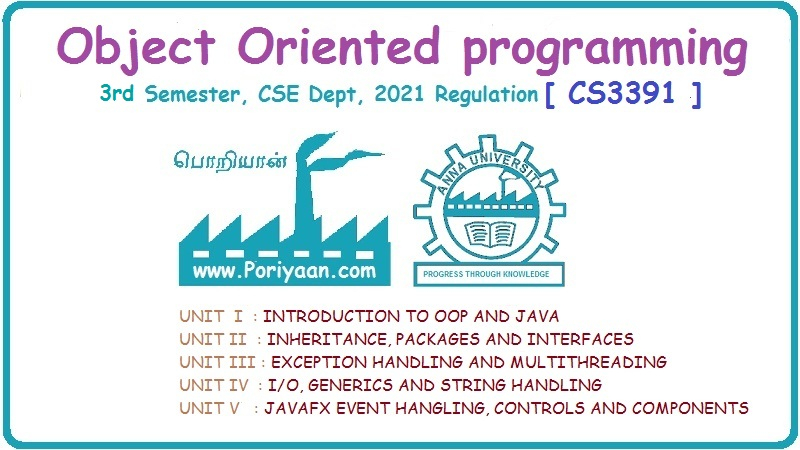Object Oriented Programming: Unit IV: I/O, Generics, String Handling
Generic Methods
with Example Java Programs
Generic method allows a programmer to write a generalised method for the methods of different data types.Suppose we want to print an array of integer, float and character type elements then normally we write three different methods performing the corresponding task.
Generic Methods
Generic
method allows a programmer to write a generalised method for the methods of
different data types.
Suppose
we want to print an array of integer, float and character type elements then
normally we write three different methods performing the corresponding task.
The object oriented feature of Java allows us to make use of same function
name. This idea is illustrated in following Java program -
Java Program[Overload Prog1.java]
import
java.io.*;
import
java.util.*;
public
class OverloadProg1
{
public
static void display(float[] a)
{
for(int
i=0;i<5;i++)
System.out.printf("
%.2f",a[i]);
}
public
static void display(int[] a)
{
for(int
i=0;i<5;i++)
System.out.printf("%d",a[i]);
}
public
static void display(char[] a)
{
for(int
i=0;i<5;i++)
System.out.printf("%c",a[i]);
}
public
static void main(String[] args)
{
float[]
dbl_a={11,22,33,44,55};
int[]
int_a={1,2,3,4,5};
char[]
char_a= {'A', 'B', 'C','D','E'};
System.out.println("\n
The Float elements are ...");
display(dbl_a);
System.out.println("\n
The Integer elements are ...");
display(int_a);
System.out.println("\n
The character elements are ...");
display(char_a);
}
}
Output
The
Float elements are...
11.00
22.00 33.00 44.00 55.00
The
Integer elements are... 12345
The
character elements are... ABCDE
But if
we override the generic methods then the code becomes more simplistic -
Java
Program[OverloadProg2.java]
import
java.io.*;
import
java.util.*;
public
class OverloadProg2
{
public static <T> void display(T[] a) //Generic
Method is created
{
for(int
i=0;i<5;i++)
System.out.printf("%s",a[i]);
}
public
static void main(String[] args)
{
float[]
dbl a= ={11,22,33,44,55};
int[]
int_a={1,2,3,4,5};
char[]
char_a= {'A', 'B', 'C', 'D', 'E'};
System.out.println("\n
The Float elements are ...");
display(
dbl_a);
System.out.println("\n
The Integer elements are ...");
display(int_a);
System.out.println("\n
The character elements are ...");
display(
char_a);
}
}
Output
The
Float elements are...
11.00
22.00 33.00 44.00 55.00
The
Integer elements are ... 12345
The
character elements are ... ABCDE
Ex. 4.5.1: Write generic method
for sorting an array of integer objects.
Sol. :
private
<E extends Comparable<E>>void bubbleSortG(E[] Arr) {
E temp;
for(int
j = 1; j < Arr.length; j++) {
for(int
i = 0; i < Arr.length -j; i++) {
if(Arr[i].compareTo(Arr[i+1])
> 0) {
temp =
Arr[i];
Arr[i] =
Arr[i+1];
Arr[i+1]
temp;
}
}
}
for(E i:
Arr) {
System.out.print("
" + i);
}
}
Review
Question
1.
Explain about generic method with suitable example.
Object Oriented Programming: Unit IV: I/O, Generics, String Handling : Tag: : with Example Java Programs - Generic Methods
Related Topics
Related Subjects
Object Oriented Programming
CS3391 3rd Semester CSE Dept | 2021 Regulation | 3rd Semester CSE Dept 2021 Regulation
